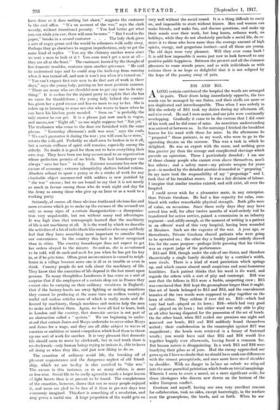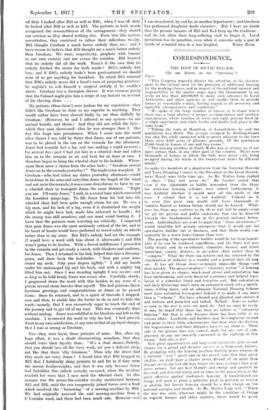B16 ANT) 815.
ALONG certain corridorsof the hospital the wards are arranged in pairs. Their doors being immediately opposite, the two wards can be managed by one Sister, and their staffs are more or less duplicated and interchangeable. Thus when I was orderly in Big the orderly of B15 took my duties during my afternoon off, and vice-versa. He and I were mates, and our jobs were continually overlapping. Gradually it came to be the custom that I did some of his work and he did some of mine. An unwritten understanding was arrived at between us. In the mornings I fetched the breakfast loaves for his ward with those for mine. In the afternoons he " prepared " those patients, in my ward, who were to go to the operating theatre on the morrow. This was a task in which he delighted. He was an expert with the razor, and nothing gave him greater joy than the strange and complicated shavings which precede an operation. These I particularly dreaded I am one of those clumsy people who cannot even shave themselves, much less others ; and a safety razor—my private weapon for yearn post--is mocked by the detailed niceties demanded in " preparing." So my mate took the responsibility of my " preparings " and I, took that of his breakfast stores. It was a fair division of labour. I imagine that similar treaties existed, and still exist, all over the hospital.
I could never wish for a pleasanter mate, in any enterprise. than Private Gresham. He had a fine capacity for calm, com- bined with rather remarkable physical strength. Both gifts were of value, on occasions. Since those early days they may have served him well, for after twelve months of ward-orderly toil he transferred for active service, gained a commission in an infantry regiment—and, oddly enough, at the moment of writing is a patient in an officers' ward of this very hospital, having been wounded at Messina. Such are the vagaries of the war. A year ago, or thereabouts, Private Gresham shaved patients who were going to be operated on ; the other day a freshly joined orderly shaved him for the same purpose—perhaps little guessing that his victim was an expert judge of the performance.
BIG and 1116, though under the rule of one Sister, and therefore theoretically a single family divided only by a corridor's width, were rivals. There is a kind of ward patriotism which springs up. and which causes absurd small suspicions and semi-humorous hostilities. Each patient thinks that his ward is the ward, and regards the others with a sort of pity and contempt. B16 was sure that the follows in BI5 were a feeble, unsporting crew ; BIG was convinced that B16 kept the gramophone longer than it ought. One set of bowls belonged to BIG and B18, and the convalescent inmates of the two wards were supposed to play together on the lawn of either. They seldom if ever did so. B15—which had very bad turf—played on its lawn ; B16—which had very good turf—played on its lawn ; but either ward was only able to play at all after having disputed for the possession of the set of bowls. On the other hand, when B17 raided our premises one night and annexed our bowls, BIG and B16 suddenly found themselves united ; their confederation in the counterplot against B17 was magnificent ; the bowls were retrieved in a frenzy of fraternal wrath ; you would have said that B18 and B16 would live together happily over afterwards, having faced a common foe. But human nature is disappointing. In a week B15 and BI6 were bandying their gibes as of yore. Had the enemy approached our gates again I have no doubt that we should have sunk our differences with the utmost promptitude, and once more have stoxl shoulder to shoulder. With no danger to induce an entente we relapsed into the more parochial patriotism which feeds on trivial imaginings Wherein I seem to scent a moral, on a more significant scale, for those ideologues who discern new dawns on the horizon of the wider European conflict.
Gresham and myself, having our own very excellent reasons for collaboration, took no sides, except banteringly, in the warfare over the gramophone, the bowls, and so forth. When he war • off duty I- looked after 1115 as well as B16; when I was off duty he looked after BIG as will as I315. The patients in both wards recognized the reasonableness of the arrangement—they shared our services as they shared nothing else. Even into this matter, nevertheless, they contrived to infuse their ridiculous rivalry. B15 thought Gresham a much better orderly than me ; and I have reason to believe that BIG thought me a much better orderly than Gresham. We were, respectively, prophets with honour in. our own country and not across the corridor. BIG boasted that its orderly did all the work Wasn't it the case that its orderly fetched the stores for both wards P BI5's orderly was lazy, and if B1G's orderly hadn't been good-natured we should none of us get anything for breakfast. To which Bit retorted that BM's orderly never did a hand's turn at preparing patients; ho oughtn't to call himself a surgical orderly if ho couldn't shave. Gresham was a champion shaver. It was common gossip that the Colonel mightgive him a stripe at any instant on account of his shaving alone. . . .
Iffy patients (bless them!) were jealous for my reputation—they didn't like Gresham to shine as my superior in anything. They would rather have been shaved badly by me than skilfully by Gresham. (However, he and I adhered to our system—to our mutual benefit, and theirs.) And they did not relish the fact— which they soon discovered—that he was stronger than I. One day this leapt into prominence. When I came into the ward after dinner I was told by Sister that Jones, one of our patients, was to be placed in the sun on the veranda for the afternoon. Jones had recently lost a leg. and was making a rapid recovery ; for several clays past I had put him in a wheeled chair and taken him on to the veranda to sit and bask for an hour or two. therefore began to bring the wheeled chair to his bedside. Where- upon there arose a chorus from the other beds: "Gresham earned Jones on to the verandayesterday !" The implication wasplain. If Gresham—who had taken my duties yesterday afternoon—could hoistJones in his arms and carry-him down the length of the ward and out onto the veranda, itwasacome-downforme to have to use a wheeled chair to transport Jones the same distance. "Right you are. I'll carry Jones," I said, in a casual tone which concealed the horridest misgivings. To lift Jones from his bed into the wheeled chair bad been quite enough strain for me. He was a big man, and his lack of a log, even if it diminished the weight which he might have had, made him awkward to handle ; for the stump was still sensitive, and one must avoid hurting it. I knew that the patients were watching me critically. I suspected that poor Jones was the most anxiously critical of the lot, and in his heart of hearts would have preferred to travel safely on wheels rather than in my arms. But B15's orderly had set the example (I would have a word with him about it afterwards !) and BIG wasn't going to be beaten. With a forced indifference I proceeded to the veranda and got ready a couch, with blankets and cushions, for Jones. Then I returned to his bed, helped him into a dressing- gown, and drew back tho bedclothes. "Now put your arms round my neck. Grip your fingers tightly." I slid my hands under his undamaged leg and his back, and with a mighty tug lifted him out. Once I was standing upright I was secure—and as long as he held firmly Jones was secure also. Carefully, slowly, I progressed down the ward with this burden in my arms of a person several stone heavier than myself. Tho bed patients threw facetious greetings and congratulations at Jones as he passed them ; these he returned, and in a spirit of bravado I stopped, now and then, to enable him the better to do so and to hide the uth—namely, that I was excessively eager to reach the end of the journey and to get rid of my load. This was eventually done without mishap. Jones was enfolded in his blankets and left to the sunshine. I re-entered the ward to tidy his bed. I had proved, if not to my own satisfaction, at any rate to that of my loyal charges, th.lt I was as strong as Gresham.
Yes—they were loyal, those patients of mine. But, after my huge effort, it was a shade disconcerting, somehow, that they should voice their loyalty thus: "It's a dam shame, Orderly, that you should 'ave all the 'envy work, an you a delicate chap, not like that there 'efty Gresham." Then why the deuce had they made me carry Jones 1 I beard later that BIG bragged to BlIS that I habitually slung patients to and fro as if they were the merest featherweights, and that it was only because Sister had forbidden this (which actually occurred, when the incident reached her ears) that I now used the wheeled chair. In this manner was the across-the-corridor rivalry maintained between 1315 and BIG, until the two temporarily joined forces over a feud which involved the " borrowing" of a mowing-machine by B18.
We had originally annexed the said mowing-machine from a C Corridor ward, and there had been much ado. However—I
I was transferred, by and by, to another-department ; and Gresham has performed doughtier deeds esewhers. But I have no doubt that the present inmates of B15 and Bnd keep up the tradition - arid do not allow their long-suffering staff to forget it. Local patriotism has its penalties, even when it concerns only a pair of wards of wounded men in a war hospital. WARD Mont.



































 Previous page
Previous page